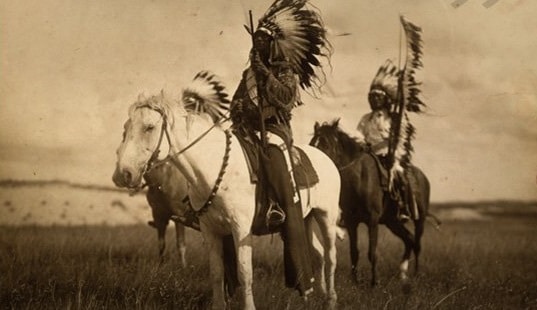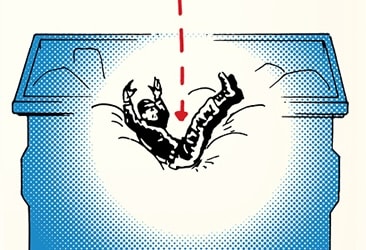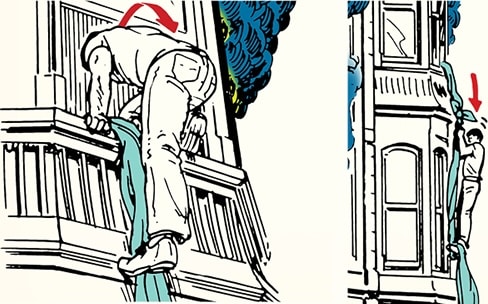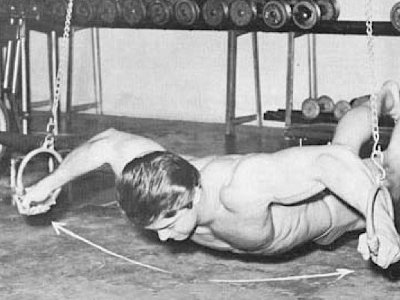
Jeremy Hall knew his mission was on the verge of going to pieces.
The year was 2003, and the Iraq War had just begun. Hall was a member of a secretive U.S. Army special operations unit nicknamed The Activity (think SEAL Team 6 but more secretive).
And at that moment, he was in a bunker in the heart of Baghdad.
“We had a team that was about to go out to a location and take out a high value target, but we had an equipment breakdown,” recalled Hall. “People started asking, ‘Are these coordinates right?’”
That’s when things got worse. “A man went down. Then another,” says Hall, whose job was to coordinate data from satellites and intercepted cell phone signals. “People were getting shot at. Our base was getting mortared. You could hear gunshots and RPGs going off outside.” Just when it seemed it couldn’t get worse, one of Hall’s colleagues experienced a migraine panic attack and Hall had to take over his duties:
“I realized I couldn’t control the level of resources I had, but I can control my reaction to this because these people are relying on me. I said, ‘I’m going to be a rock right now.’”
With a variety of Special Forces commandos depending on his team — “Green Berets, Delta Force, combat patrollers, that sort of thing” — Hall knew there was no other option but to make the best of the situation. “We just stayed firm and focused on what we were doing and our adrenaline kicked in once we made the decision to stay calm.” Ultimately, the team executed the operation without any more casualties.
“It would have been easy to say, ‘Oh crap we don’t have our normal tools,’” says Hall. Instead, he asked himself, “How can I make the best out of this scenario — what can I do in actionable steps to achieve our goal?”
Why Your Mental Toughness Matters
Even if you’re lucky enough to never be in a situation as stressful as what Hall faced, you will face situations which will test your mental toughness. It’s a part of life.
Whether it’s losing your job, or your business going under, or losing a loved one, life is filled with stressful situations. These are times when your mental strength will be challenged and your resilience tested. As a husband, as a father, or simply as a man, we are often expected to be mentally tough, yet we often don’t know how.
AoM has previously covered different dimensions of the topic of mental toughness, writing about how to strengthen willpower, how to tap into hidden wells of strength, and how to cultivate your mental toughness through small discomforts and positive thinking.
In this post I want to share four exercises that are inspired by the stories of brave men who have endured the hardships of war that can help any man strengthen his mental toughness.
You may never be caught in a firefight on a foreign battlefield, engage in a Special Forces operation, or lead men into battle on hostile grounds. My goal here is to teach you a few tips from those who have experienced these challenges, so that you can have greater mental toughness in your own personal and professional life.
And if you follow all of these tips, then the next time you meet a Green Beret or a Navy SEAL, you can say, “Hey, I’m just as mentally tough as you!” (No, seriously, do not do that.)
4 Exercises for Strengthening Your Mental Toughness
You may be wondering at this point: what is mental toughness, after all? “Much of mental toughness is simply attitude and self esteem,” writes Stewart Smith, a former Navy SEAL and author of The Complete Guide to Navy SEAL Fitness. “I am of the personal belief that through tough physical training, proper mindset, and a high level of maturity that mental toughness is born.”
In other words, mental toughness comes from a combination of factors rather than any single one. Here are four strategies that can help you achieve that rare combination.
1. Train Yourself to Increase Your Confidence
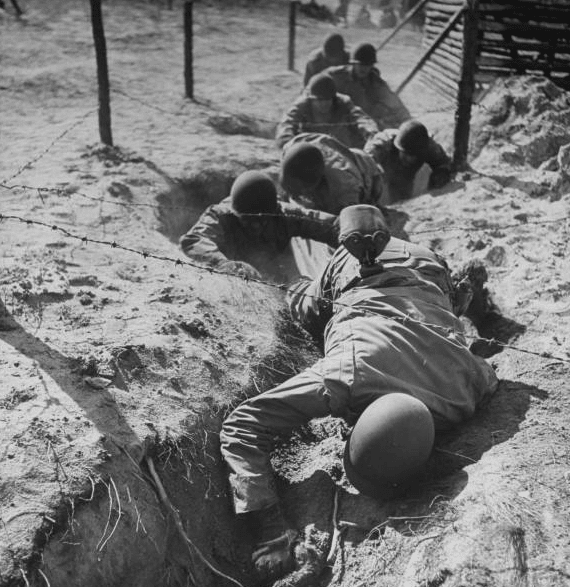
Jon Paulson was just 19 years old when he enlisted in the Marines. He spent six months training at Camp Pendleton in San Diego in 1964-1965. “The training is very, very rigorous,” says Paulson. “You do things over and over and over again and you become good at it. And being good at something gives you confidence.”
That training gave Paulson crucial confidence, which he would need a few months later, when, in July 1965, he was deployed as part of the second wave of Marines to enter South Vietnam. He was in charge of a platoon of 40 men, and was just 22 years old.
“The number one objective in the Marines is to complete the mission; the second is to protect the men in the platoon,” says Paulson. “So the mission supersedes the safety of the men. As a platoon leader, you know you’re going to have to send a squad directly into the line of fire, but you have to do that to accomplish the greater mission.”
When making those kinds of calls, you absolutely must project confidence, he says. “Even if you’re leading just four people, you have to have confidence — and have to have the confidence of those three men in your command,” says Paulson.
The same principle which works for the Marines — aggressive training to increase confidence — can be applied in the civilian world. “If you get up and speak a lot then you get better at it and you will get more confident,” says Paulson.
Exercise:
Paulson was trained for confidence by the U.S. Marines. But you can train yourself to be confident as well.
It starts with steady and deliberate practice, and continually testing yourself to live on the edge of failure.
LaRae Quy, the author of Secrets of a Strong Mind, suggests a strategy to increase your confidence by overcoming smaller failures. The goal is to help you become more confident in the face of larger challenges. Create a “petri dish” in your life, writes Quy, “a little area in which [you’re] not succeeding.” This could mean learning a musical instrument or a new sport or studying a new language.
By challenging yourself on a daily basis with a skill you are not fully mastering, “you develop greater confidence in your skills and training and avoid greater meltdowns when the larger failures do occur,” says Quy.
2. Embrace Your Sense of Duty
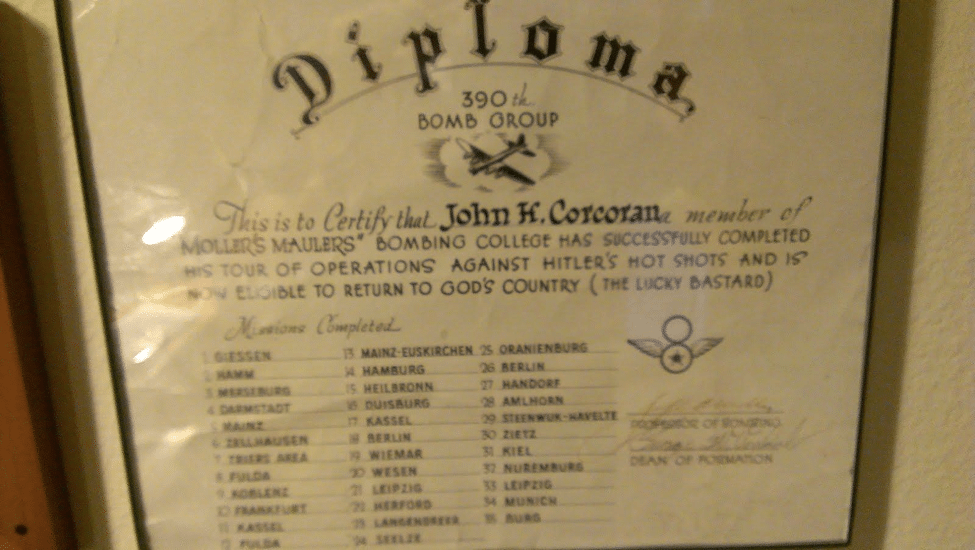
My grandfather’s “diploma” from completing 35 bombing missions as part of the 390th Bomb Group during WWII.
Often the simplest form of mental toughness is simply to tell yourself, “It’s my job.”
My grandfather was a B-17 pilot in Europe during WWII, flying bombing missions out of England over German cities.
In May of 1945 he was on a bombing mission over Nuremberg when they were attacked by German fighters and “got the hell shot out of them,” my father said later.
After the war, my grandfather was stationed as an air rescue pilot at an air base in Narsasauwak (now spelled Narsarsuaq), Greenland — an area renowned for its heavy fog.
One day, two airplanes were flying in together from overseas and the fog layer was so low you couldn’t see the surrounding mountains. The planes had limited working instruments and had little chance of landing without assistance.
The base commanders “basically said they can crash land on the ice cap and we’ll try to save them,” recalled my father. “Dad and his crew volunteered to fly up and help the two planes land.”
My grandfather flew above the cloud layer, and using what he knew about the mountain range, had each plane follow him through the fog directly to the runway so they could land. My grandfather received an air medal for the rescue.
I asked my father why he thought my grandfather volunteered to go up. “It was a sense of duty,” he said. “It was his job. He was a pilot and that’s what they do.”
Exercise:
Write down a “job description” for all the different hats you wear in your life. Not just for your work, but in the other roles you fulfill, like husband, father, and mentor (Brett’s post on creating a blueprint for your life can help you recognize and define these roles). Tape these descriptions in a place where you will see them often or keep them in a notebook and review them weekly. No matter your different responsibilities, treat them like duties. Take the option of shirking them off the table entirely. When times get tough, and you’re fatigued, annoyed, bored, and stressed, remember that it’s your duty to get your job done. You agreed to do it, and a man keeps his word. People’s lives may not literally hang in the balance, but your associates and loved ones do absolutely depend on you and your ability to stay strong when things around them get shaky.
3. Do What You Do For Your Team

Each of the men I interviewed for this article said versions of the same thing, across multiple generations and across multiple wars. They each said they fought for each other, rather than any larger principle or purpose.
“You get to know your fellow troops,” says Paulson. “You get to know your buddies really well, very very well. Not one person who fought in Vietnam ever [fought to] prevent communism from spreading. Not one.”
Instead, Marines fought for one another, for their fellow soldiers, said Paulson. “The Marines have a saying, ‘No one left behind,’ whether the person is dead or alive. It’s really true.”
Jeremy Hall, who fought in both the wars in Iraq and Afghanistan, agreed. “It was more about the team — it was about the men and women who I was serving with,” says Hall. “It wasn’t about the cause. It wasn’t patriotism, though I was patriotic. It was about the people I was with — these were people who were trying to create better lives for themselves. They just happened to serve during a period of war.”
The lesson for me is that when you endure a challenge in life, you need to have a strong team around you. Whether you are fighting to keep your company afloat, facing an illness in the family, or just lost a job, your mental strength is more likely to come from those who you have around you — your team — than it is commitment to any larger cause or purpose.
Exercise:
Write down the names of your trusted teammates — it could be your family, colleagues, or friends. Under each name, write down two things you can do to strengthen your bond with that person. Work to surround yourself with people who you trust and care for, and you’ll be more likely to endure during times of challenge.
4. Find Pride on the Inside
Today’s culture is filled with awards and rewards. You get a trophy just for being on the team.
In fact, you don’t need a ribbon or a certificate to take pride in yourself and your accomplishments.
Hall told me a story of a sudden knife fight he got into in Iraq in 2003 with “a very fast-moving Iraqi.” The man slashed Hall’s wrist, but he “hung in there and knocked him out.” As he fell, another special forces soldier shot the man in the head.
Hall didn’t receive a purple heart for the injury because the paperwork was never processed. When I asked Hall if he was disappointed by this, he shrugged it off. “That’s just war,” he said.
Hall didn’t need a purple ribbon on a metal clasp to take pride in his achievements. Nor does he allow himself to feel disappointment by not having the distinctive medal.
After he left Vietnam, Jon Paulson found he didn’t need any modern trappings of success either.
“Any time that I would get in a situation where I lost a client or lost a deal or lost a job, I would say, ‘What am I getting worked up over this for, I’m alive, I’m happily married,’” says Paulson. “I’m not climbing the corporate ladder, and I’m not going to be a multi-millionaire, but that doesn’t matter to me.”
Paulson said it was enough to have pride that he was a good leader and that he was brave in leading 40 men into battle. “I think anybody would say Lieutenant Paulson was calm under fire when we had to rush a hill or take out a machine gun. He didn’t stay behind. He led.”
Today, Paulson is dealing with the effects of constant contact with Agent Orange while in Vietnam, but he doesn’t regret his involvement in the war. “I feel very proud of what I did. I don’t feel proud of calling in jet bombers on a village; I don’t feel proud for what our country did to the Vietnamese people, but I do feel proud of what I did for my platoon. I was a good leader.”
Exercise:
Write down a list of all the things you are proud of in your life, especially things you’ve never been recognized for by others. Notice the satisfaction you feel from your accomplishments and worthy traits, and realize you don’t need the validation of others for them to be real. Like Jeremy Hall, your life should not be any different because you have a ribbon or an acrylic award you use as a paperweight on your desk. Take pride internally.
Go Exercise Your Mental Toughness
Hall says one of the most important aspects of mental toughness is not to worry about failure, but simply to make sure you always try. “I had a mentor who said you can fail and we’ll figure out how to execute the next time, but what I can’t stand is if you don’t try your best,” says Hall. “I’m not going to be a winner at everything I do but I can at least find out where I am going to win and get better at that.”
Personally, I have never been in war. I feel fortunate I never had to decide which group of my closest buddies would lead the charge up a hill toward a gunnery like Paulson has, or fight my way out of a knife fight, like Hall has.
But I have suffered setbacks in life, and I know I will again. And you will too. And that’s why spending time learning from brave individuals who have demonstrated tremendous mental strength is well worth your time.
So go out there and exercise your mental toughness. Challenge yourself on a daily basis with a skill you have not mastered so you can improve your confidence for when times get rough. Embrace, and take pride in, your own sense of duty.
Be proud of yourself and don’t let external rewards or awards determine your self-worth.
And surround yourself with a team you trust. Remind yourself when you go through struggles, you are all in it together.
___________________________
John Corcoran is an attorney and former Clinton White House Writer. He writes about business networking and social skills for Art of Manliness. He has a free, 52+ page guide which you can download, called How to Increase Your Income Today by Building Relationships with Influencers, Even if you Hate Networking.



